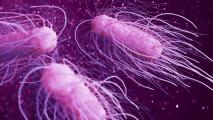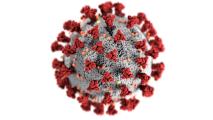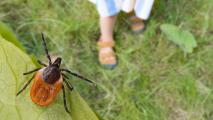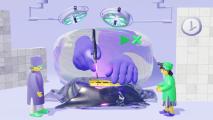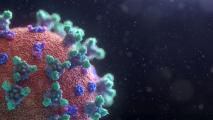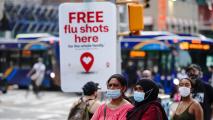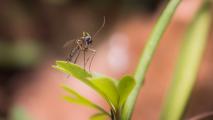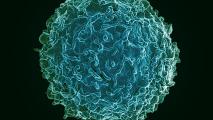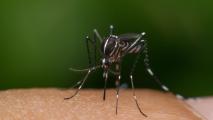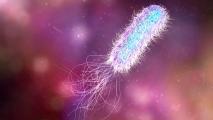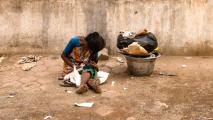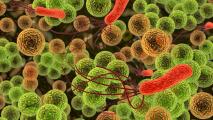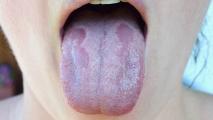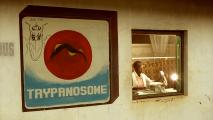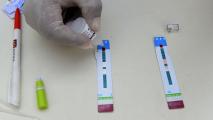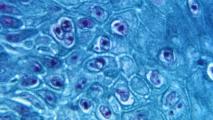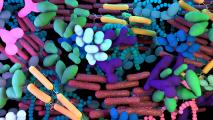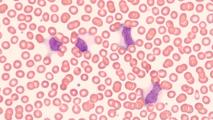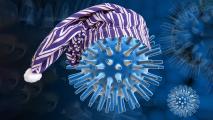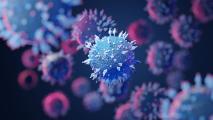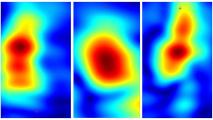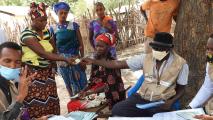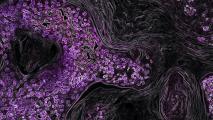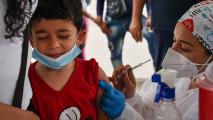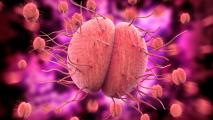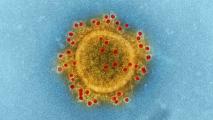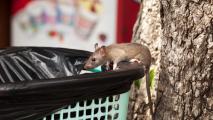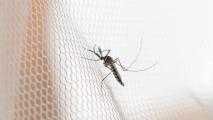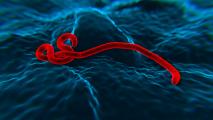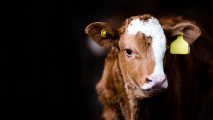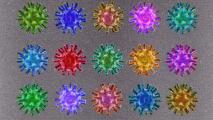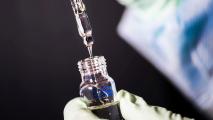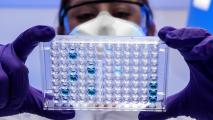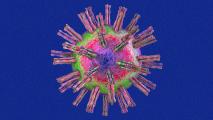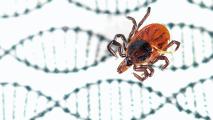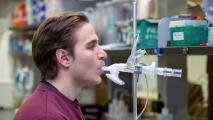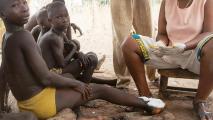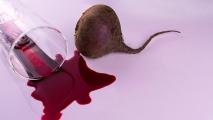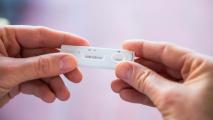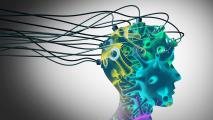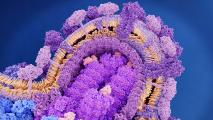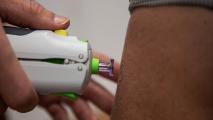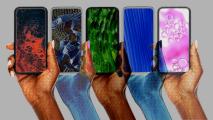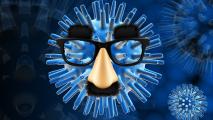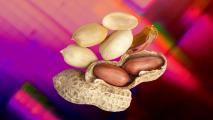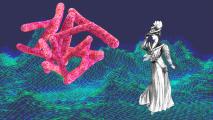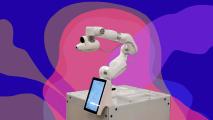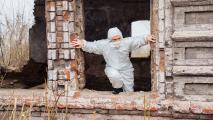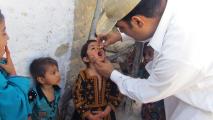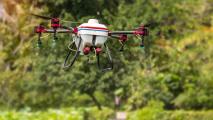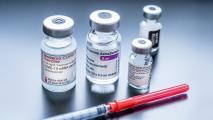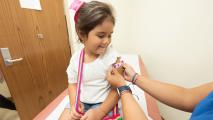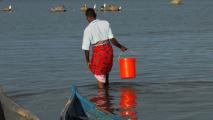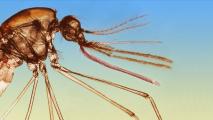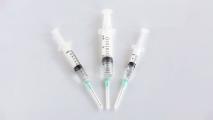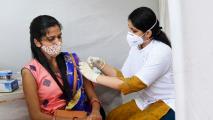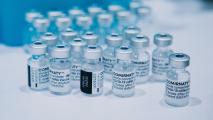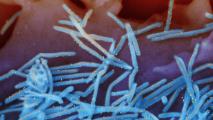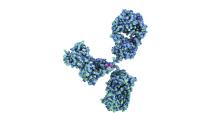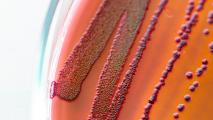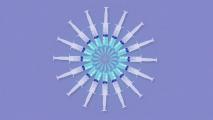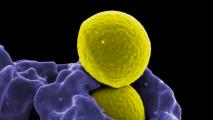Field: Public Health
Light pulses can stop dangerous food poisoning like Salmonella
A team at Penn State has developed a pulsed light technique capable of killing common food poisoning pathogens.
Yale study finds low levels of a hormone may predict long COVID
Yale and Icahn School of Medicine researchers may have found biomarkers for identifying long COVID.
Only human Lyme vaccine in development enters phase 3 trial
Pfizer and French biotech Valneva have announced a phase 3 clinical trial testing the human Lyme vaccine.
Why don't surgeons train like fighter pilots? Now some do.
Using AI and analysis, Theator is helping surgeons improve how pilots and pro athletes do: by going to the tape.
How child mortality fell from 40% to 3.7% in 200 years
The collapse in child mortality rates is a testament to the tremendous benefits of scientific, technological, and economic progress.
Nasal COVID-19 vaccines prepare for infection right where it starts – in your nose and throat
Intranasal vaccines are best suited to protect against pathogens that enter through the nose, like the flu or the coronavirus.
A historian identifies the worst year in human history
The year 536 ushered in the coldest decade in thousands of years and started a century of economic devastation.
Nanoparticles may automatically clean your teeth one day
Shapeshifting nanoparticles may one day lead to automated oral care.
Universal flu vaccine enters phase 1 trials
NIAID researchers have begun a phase 1 trial of a new universal vaccine candidate that was promising in animal challenge studies.
He lost his baby daughter. Then he turned his grief into a tool for NICU parents.
After losing his daughter, a father found a way to help other NICU parents.
“Passive cooling” could reduce indoor temps by up to 25 F in a heat wave
University of Oregon researchers have discovered that simple acts like drawing shades during peak sun and opening windows at night may help save lives during heatwaves.
A “Peter Pan” chemical could stop mosquitoes, without hurting other insects
Entomologist Naoki Yamanaka has an idea for how to handle mosquitoes: What if we just stop them from growing up?
Gene-edited wheat less likely to produce “probable carcinogen” acrylamide
A new gene-edited wheat contains 90% less of a compound that can turn into acrylamide — a likely carcinogen — when the crop is cooked.
CRISPR could create a one-shot treatment for HIV
Researchers have used gene editing to engineer HIV-fighting immune cells inside the bodies of mice.
A vaccine against mosquito saliva may be the key to stopping their diseases
University of Leeds researchers have identified a compound in mosquito saliva as a potential target to protect against multiple viruses.
A smart bomber for bacteria could help save antibiotics
Brown University researchers have developed a “smart” drug delivery system that only releases its payload when bacteria are present.
Handheld antibody tester could reveal if you’re immune to COVID
Hong Kong researchers have developed a handheld COVID antibody testing device more capable than current home tests.
We need to know about progress if we’re concerned about the world’s large problems
Our World in Data explains their mission to publish the “research and data to make progress against the world’s largest problems.”
Tiny nanoscale drills can bore holes right through bacteria
Rice University researchers have developed tiny, bacteria-boring drills in an effort to stop superbugs.
The key to fighting fungal infections may have been inside us all along
MIT researchers have discovered that complex molecules in mucus can keep fungal infections in check.
The US Civil War drastically reshaped how Americans deal with death – will the pandemic?
How do American's attitudes towards death change when they are confronted with such enormous losses?
Three more nations eliminate sleeping sickness as a public health threat
Sleeping sickness is a horrifying disease mainly impacting the rural poor. But three more African nations have succeeded in curtailing its threat.
Why at-home STI tests may (finally) be about to take off
Inspired by the home testing of the pandemic and rising STI cases, some experts think that more accessible testing may be an important public health tool.
This already-approved drug could help repair the brain after stroke
Ohio State researchers have found that an already approved anticonvulsant drug helps increase stroke recovery in mice.
What is monkeypox, and how we may fight it
As monkeypox cases crop up around the world, vaccines designed for the far deadlier smallpox may play a key role in stopping it.
New drug combo is “a paradigm shift” in preventing asthma attacks
The combination of a rescue medication and a corticosteroid, taken as needed, reduced both short and long-term risk of asthma attacks.
Nanobots are real, and they can battle bacteria
Researchers have developed antibiotic nanobots that can traverse a wound on their own.
Will new vaccines be better at fighting coronavirus variants?
New virus-based vaccines could play an important role in generating a long-lasting, broad immunity against a rapidly mutating virus.
How we treat inflammation may be causing chronic pain
Reversing common belief, researchers at McGill say treating inflammation may be causing chronic pain, not preventing it.
New vaccine for Epstein-Barr virus enters human trials
A Epstein-Barr virus (EBV) vaccine entering human trials could potentially protect against everything from mono to multiple sclerosis.
How herpes wakes up
Researchers believe they have identified how herpes hiding in your cells wakes back up to cause symptoms.
Moderna expects to have Omicron booster ready by Fall 2022
Moderna expects to have an Omicron booster that combines its original COVID-19 vaccine with one targeting the variant ready by Fall 2022.
5G millimeter wave tech may prevent unnecessary skin biopsies
Stevens Tech researchers have developed a device which uses the same tech as the TSA does to find skin cancer tissue without a biopsy.
Surprise in death data: Malaria has a U-shaped death curve
Better death records can reveal surprises about common killers like malaria — and help save lives.
How Robert Langer, a pioneer in delivering mRNA into the body, failed repeatedly but kept going
Langer published the first paper to show that it was possible to deliver nucleic acids like RNA and DNA to the body via tiny particles.
Researchers want to fight cancer — by mutating it even more
Sloan Kettering researchers have proposed a controversial way to improve immunotherapy: making cancer cells mutate on purpose.
Moderna applies for approval of COVID-19 vaccine for children
Moderna has asked the FDA to authorize its COVID-19 vaccine for children ages 6 months through 5 years.
Meningitis vaccine appears to protect against gonorrhea, too
Young people who received a meningitis vaccine appeared to be protected against the sexually transmitted infection gonorrhea, too.
Researchers identified over 5,500 new viruses in the ocean
These discoveries help scientists better understand not only the evolutionary history of viruses but also the evolution of life on Earth.
New UV light safely kills 98% of airborne pathogens indoors
Far-UVC light — a type of ultraviolet light that isn’t harmful to human health — killed 98% of airborne microbes indoors in a new study.
Internet-connected “smart” traps help cities combat rats
Internet-connected rat traps are bringing rodent control into the 21st century, helping cities leverage data in the battle against rats.
Paris plans to be completely cyclable by 2026
France is investing a total of 250 million euros ($290 million) to make the city of Paris entirely bikeable.
New children’s malaria treatment clears out infection in liver
Malaria can hide in the liver, causing relapse months or years later. Now, public health officials have a new treatment to prevent relapse for children under 16.
New Ebola antibodies neutralize the most dangerous strains of the virus
Researchers have found two new antibodies which bind to the most dangerous strains of Ebola.
A meat-free world by 2035? “Totally doable,” says Impossible Foods CEO
"Our mission is to completely replace the use of animals as a food technology by 2035," said Impossible Foods CEO Patrick O. Brown.
Safer painkillers: A novel drug treats pain without killing people
Painkillers have nasty side effects, such as organ damage or addiction. Researchers have discovered a new drug that may cause none of these.
Moderna will develop mRNA vaccines for Ebola, malaria, other major threats
Moderna is developing mRNA vaccines for 15 “priority" pathogens and launching a program giving other developers access to its mRNA tech.
90% of drugs fail clinical trials – here’s one way researchers can select better drug candidates
It’s disappointing when the years of effort and resources spent to push a drug candidate to patients so often lead to failure.
How mRNA and DNA vaccines could treat autoimmune disorders, genetic diseases, and more
Using DNA or an mRNA vaccine, researchers are investigating the feasibility of essentially replacing missing genes that cause disease.
Moderna is developing a herpes vaccine
Moderna is developing a herpes vaccine that could protect you against the most common sexually transmitted infection in the world.
We can now use CRISPR to fight tick-borne diseases
U.S. researchers have overcome a hurdle that was preventing the use of CRISPR to fight tick-borne diseases, such as Lyme disease.
Golden blood: The rarest blood type in the world
Golden blood, despite sounding like medical nonsense, is actually the nickname for Rh-null, the world’s rarest blood type.
MIT invents $4 solar desalination device
MIT has developed a $4 solar desalination device that could provide a family of four with all the drinking water it needed to survive.
Inhaled vaccine for coronavirus moves to human trials
An inhaled vaccine now moving into human trials could protect people from more than just the coronavirus that causes COVID-19.
Guinea worm disease is near eradication, Carter Center says
After decades of work, cases of human Guinea worm disease are in the double digits — putting elimination of the painful infection in sight.
Harm reduction vending machines are coming to New York
New York City has announced a pilot program installing public health vending machines with overdose drugs and clean needles.
Beet juice “blood” is a potent way to kill mosquitoes
Molecular Attraction plans to kill mosquitoes transmitting malaria by tricking them into drinking beet juice “blood” laced with toxins.
You can finally order free COVID-19 tests online
Every American household can now request four free COVID-19 tests from the U.S. government using a newly launched website.
Researchers are testing neural stimulation as a long COVID treatment
Small pilot trials of two different types of external electrical brain stimulation suggest the technique may work as a long COVID treatment.
Researchers find a new target for a universal flu vaccine: the “anchor”
There’s a new target in the battle for a universal flu vaccine: the "anchor,” a part of the virus’ proteins less likely to mutate.
India authorizes “world’s COVID-19 vaccine,” created in Texas
India has just become the first nation to authorize a cheap and easy to manufacture new COVID-19 vaccine called Corbevax.
Reasons to be optimistic in 2022
It can be tough to feel positive after the past two years. But a closer look at the recent past provides reasons for optimism in 2022 and beyond.
Needle-free COVID-19 vaccine is in human trials
A needle-free COVID-19 vaccine now in human trials could protect us against both this disease and future coronavirus outbreaks.
This app offers alternatives to 911 in all 50 states
There are instances when 911 may not be the best number to call. Subdial, a free app, offers local and national alternatives to 911.
Falling traffic lights can kill. One tweak could save lives.
An impact-absorbing traffic light pole could save the lives of drivers and pedestrians, while also cutting repair and replacement costs.
How herpes hides
Herpesvirus hides in nerve cells, making it impossible to kill. Now, Northwestern researchers believe they have found the novel key to this nasty trick.
A simple webcam can automatically catch — and treat — infant jaundice
Researchers in Australia and Iraq have developed a system that uses a webcam to catch infant jaundice and begin treatment right away.
This device can automatically detect and reverse opioid overdoses
Researchers at the University of Washington have developed an AI-powered wearable to detect, and reverse via naloxone injection, opioid overdoses.
A patch to treat peanut allergies appears safe to wear for years
A peanut allergy can be debilitating at best, and life threatening at worst. A new possible treatment looks to be safe to wear for at least three years.
7 scientists we are thankful for this Thanksgiving
One of these scientists saved more lives than any other person in history.
Tuberculosis may spread through aerosols, without coughing
University of Cape Town researchers believe tuberculosis may spread in small aerosols, much like COVID-19.
Vaccine robot administers doses without needles or human help
Canadian startup Cobioni has built a vaccine robot that can deliver a dose into a patient’s arm without a needle or any human help.
Deal brings COVID-19 vaccines into conflict zones
The U.S. has brokered a deal between Johnson & Johnson and the COVAX initiative to get COVID-19 vaccines to people in conflict zones.
Just $50 can turn your phone into a powerful chemical, pathogen detector
If this becomes a common feature of smartphones, it could someday allow anyone to identify pathogens and detect impurities in food.
Rhode Island will be the first state to open safe drug consumption sites
In an important test of drug harm reduction techniques, Rhode Island is set to become the first state to open safe consumption sites.
A new clue in why oral vaccines don’t work as well in developing countries
Oral vaccines are crucial to public health, but work worse where they are needed most. A new mouse study has a potential reason why.
Rwanda is blasting killer mosquitoes with drones
Rwanda is deploying drones to target mosquito larvae — spraying anti-mosquito insecticides in areas where the frequency of mosquito-borne illness remains high.
You can now mix and match COVID-19 booster shots
Americans eligible for COVID-19 booster shots no longer need to stick to one brand. Here’s why that’s a big deal.
FDA panel recommends COVID-19 vaccine for 5 to 11 year olds (Updated)
An FDA panel voted to authorize Pfizer’s COVID-19 vaccine for kids ages 5 to 11. Here’s what you need to know about it.
Johns Hopkins receives the first NIH grant for clinical psychedelic research in half a century
For the first time in decades, the National Institutes of Health is funding a clinical psychedelic study, perhaps a turning point for the field.
New water purification tablet makes river water safe to drink
A new water purification tablet that simply and quickly decontaminates river water could help address global drinking water scarcity.
WHO recommends its first malaria vaccine
A malaria vaccine developed by GlaxoSmithKline, Mosquirix, has been recommended for use by the World Health Organization.
A malaria antibody prevented infections in purposefully-infected volunteers
In a small study, researchers found an antibody that prevents malaria infection in people purposefully infected with the parasite.
Want better nasal vaccines? Look to the bacteria in your nose.
Researchers are investigating the link between the bacteria inside your nose and how effective nasal vaccines can be.
FDA approves COVID-19 boosters for seniors, high-risk groups (Updated)
The FDA has expanded its authorization of COVID-19 boosters of Pfizer’s vaccine to include seniors and people in high-risk populations.
Pfizer says its COVID-19 vaccine works in kids
New trial results suggest Pfizer’s COVID-19 vaccine works in kids between the ages of 5 and 11, safely triggering a robust antibody response.
How we doubled our life expectancy in the last 100 years
“The idea of taking a pill and getting better is actually a very recent invention.”
Study: COVID-19 booster shots dramatically reduce infection risk
A large COVID-19 booster shot study in Israel found that a third dose significantly increased seniors’ protection against the coronavirus.
UK researchers are growing the Delta variant for human challenge trials
Responding to the variant’s rise, UK researchers are growing the Delta variant for trials.
India’s DNA vaccine for COVID-19 gets emergency approval
India has granted emergency approval to the world's first DNA vaccine for COVID-19.
Pfizer’s shot is the first FDA-approved COVID-19 vaccine
Pfizer’s shot has become the first FDA-approved COVID-19 vaccine, making the transition from emergency use authorization on August 23.
Using body bags to treat heatstroke
The Pacific Northwest heat wave crushed hospitals with heatstroke victims. Doctors turned to body bags to save lives.
Graphene foam sucks uranium out of contaminated water
MIT researchers have developed a graphene foam water filter that eliminates uranium contamination in hours.
Pfizer’s RSV vaccine 100% effective in human challenge trial
An RSV vaccine developed by Pfizer was reportedly 100% effective in a small human challenge trial and caused minimal side effects.
Inside your nose, it’s bacteria vs. bacteria in the fight against meningitis
Researchers have found that nose drops containing “friendly” bacteria can protect people against meningitis-causing bacteria.
New antibodies may lead to a norovirus vaccine
Researchers have discovered antibodies that neutralize a variety of norovirus strains, a possible step toward an effective norovirus vaccine.
Harvard has a vaccine against septic shock
A new vaccine platform based on biomaterial may eventually provide rapid protection against multiple bacterial threats.
New vaccines may use AI to hit a moving target
Can AI create vaccines that work against mutations that haven't happened yet, groups of viruses, and virus too tricky to currently stop?
Lucky accident shows how immune system can beat MRSA without antibiotics
Researchers have accidentally found that blocking caspase enzymes can make mouse immune responses more robust.
